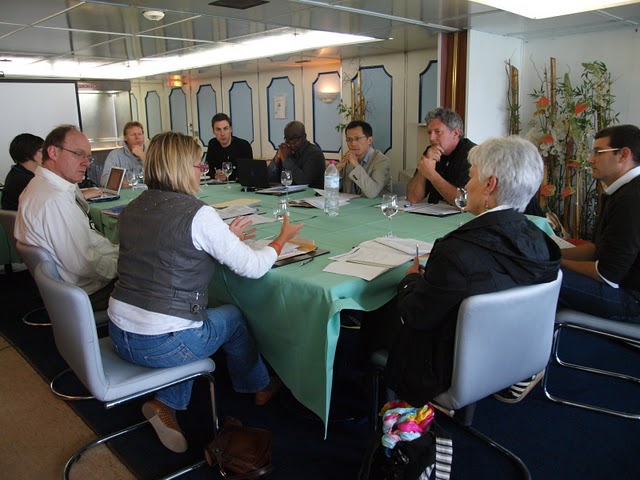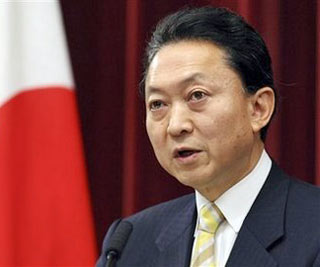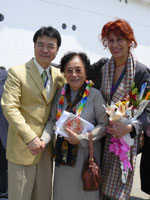| Organizers | 

| | |
Dear Friends and Supporters of Article 9, We are pleased to send you some information about the Global Article 9 Campaign to Abolish War's recent activities and related developments. | NPT REVIEW CONFERENCE: ANY PROGRESS TOWARDS DISARMAMENT?
After a month of intense debate,the NPT Review Conference came to an end on May 28 with the adoption byconsensus of a final document that reaffirms the nuclear-weapon states'"unequivocal undertaking" to disarm and calls for an international conference in 2012to establish a nuclear-free Middle East, but that fails to set a timeline forprogress towards actual disarmament.
 In contrast to the 2005 NPTReview Conference that failed to reach an agreement, the event this year tookplace in a climate of optimism, encouraged by US President Barack Obama's vision of "a world without nuclear weapons". UN Secretary General Ban Ki-Moon welcomed the "strong spirit of compromise and cooperation" among member-states. Qualifying the conference success and the final document significant, Ban declared, "the agreement on concrete actions will advance al lthree pillars of the treaty - disarmament, non-proliferation and peaceful useof nuclear energy." In contrast to the 2005 NPTReview Conference that failed to reach an agreement, the event this year tookplace in a climate of optimism, encouraged by US President Barack Obama's vision of "a world without nuclear weapons". UN Secretary General Ban Ki-Moon welcomed the "strong spirit of compromise and cooperation" among member-states. Qualifying the conference success and the final document significant, Ban declared, "the agreement on concrete actions will advance al lthree pillars of the treaty - disarmament, non-proliferation and peaceful useof nuclear energy."
Among the key outcomes, nuclear weapon States agreed to "accelerate concrete progress on steps leading tonuclear disarmament"; member-states (including Iran) accepted the role of theUN Security Council in upholding compliance with IAEA safeguards agreements;and called for a conference on the establishment of a nuclear-weapons free zonein Middle East to be held in 2012. However, many NGOs expressed disappointmentthat little progress was actually made on disarmament, due to the lack ofprogress made towards a convention to ban nuclear weapons.
Indeed, while the text is the first of such documents to refer to a Nuclear Weapons Convention, it fails toinclude a timetable for the start of negotiations, despite the many attempts bymost member-states to set up timelines to disarmament efforts - nuclear weaponsstates only agreeing to commit to "make special efforts to establish thenecessary framework to achieve and maintain a world without nuclearweapons."
In fact, the final document didnot break any new ground, limiting itself to reiterating past commitments andthe need to implement them. It did, however, "express deep concern at thecatastrophic humanitarian consequences of any use of nuclear weapons andreaffirm the need for all States at all times to comply with applicableinternational law, including international humanitarian law." According to Susy Snyder of Pax Christi, this reference paves the way to "address[ing] the issue of the use of nuclear weapons as a violation of international humanitarian law, as well as to, potentially, negotiate a ban on the use ofnuclear weapons." Further, it advances the 1996 advisory opinion of theInternational Court of Justice on the illegality of nuclear weapons.
Despite public statements infavor of disarmament, the absence in the final document of firm commitments and of any benchmarks toward their implementation testifies of a real lack ofpolitical will among the nuclear-weapons states to fulfill their obligation to disarm.
Civil society organizations present at the NPT Review Conference expressed their disappointment that "the gap between reassuring rhetoric about nuclear disarmament and realprograms to rid the world of nuclear weapons is unacceptably wide at the end ofthis Conference."
In a statement issued by NGO Abolition Caucus at the NPT Review Conference, they announced they would "not resigne(d) [them]selves to another five years without an action plan for the abolition of nuclearweapons. Upon the conclusion of this Review Conference, NGOs will immediately reach out to those States who have voiced support for a Nuclear Weapons Convention, and will explore steps we can take together to build a global foundation for such a treaty." Many are supporting the proposal (deleted from the text of the final document) calling on the UN Secretary General to convene an international conference ahead of the 2015 NPT Review Conference to develop a roadmap towards the complete elimination of nuclear weapons within a specified timeframe, including through a Nuclear Weapons Convention.
Dr. Rebecca Johnson, vice-chairof the International Campaign to Abolish Nuclear Weapons (ICAN), told the media: "The action plan on nuclear disarmament as well as the inability of the NPT machinery to deal with non-compliance and to strengthen its own safeguards agreements, as illustrated in what was left out of the final document, make itnow clear to everyone the need to initiate a process leading to negotiations ona Nuclear Weapons Convention that will do away with the NPT distinction between nuclear haves and have-nots and comprehensively ban nuclear weapons for all."
 It is in this spirit that aninternational consultation seminar was held onboard Peace Boat on June 10-14during the segment between Norway and Ireland. Representativesof parliamentarians, mayors, the United Nations and NGOs from Europe, the US,the Pacific and Japan explored the various opportunities and challenges following the NPT RevCon, and identified approaches, strategies and partners in order to advance the process towards a Nuclear Weapons Convention. It is in this spirit that aninternational consultation seminar was held onboard Peace Boat on June 10-14during the segment between Norway and Ireland. Representativesof parliamentarians, mayors, the United Nations and NGOs from Europe, the US,the Pacific and Japan explored the various opportunities and challenges following the NPT RevCon, and identified approaches, strategies and partners in order to advance the process towards a Nuclear Weapons Convention.
A group of eight Hibakusha (Survivors of the atomic bombs in Hiroshima and Nagasaki) is also taking part in Peace Boat's third Global Voyage for a Nuclear-Free World during which they sharetheir tragic experiences, educate people about the human costs of nuclear weapons and lobby government officials and other high level decision-makers about the urgent need to make a nuclear-free world a reality. Dialogue was held together with the seminar participants on the strong recognition of the lasting effects of nuclear weapons on humanity, as well as humanitarian perspectives on the pathto a Nuclear Weapons Convention.
The statement issued at the end of the NWC consultation seminar will be available on Peace Boat's website shortly.
Read Ban Ki-Moon's Statement here. Read the NPT outcome documenthere. Read the full text of theNGO Abolition Caucus statement here.
Read the International Campaign to Abolish Nuclear Weapons (ICAN)'s report entitled "NPT Review Conference2010: Towards Nuclear Abolition" here. |
HUMAN RIGHT TO PEACE - A STEP CLOSER Recent months haveseen important developments towards the codification of a Human Right to Peace. Last December, anexpert workshop on the right of peoples to peace was held in Geneva, at the requestof the UN Human Rights Council who thought it would help clarifying thecontent, scope and legal nature of the right of peoples to peace.
Among the manyexperts' recommendations was that the Human Rights Council should create anopen-ended working group charged with the codification of the human right topeace. Further, the Human Rights Council's Advisory Committee shouldprepare "elements for the elaboration of an universal declaration on the humanright to peace and to propose guidelines, norms and principles aimed at protecting and promoting that right." On June 17, 2010 theCouncil adopted Resolution 14/3 requesting the Advisory Committee to drafta declaration on the right of peoples to peace in consultation with States,International Organizations and other stakeholders, which will be submitted atthe Human Rights Council's 17th session in June 2011.
Seizing themomentum towards the codification of the human right to peace in internationallaw, the Spanish Society for International Human Rights Law (SSIHRL) and theInternational Catalan Institute for Peace held a meeting in Barcelona with tenexperts from all continents, who together worked on developing a Declaration onthe Human Right to Peace meeting all requirements of the international civil society.
The so-called Barcelona Declaration on the Human Right to Peace, adopted on June 2, 2010,will be submitted to the International Congress on the Human Right to Peace tobe held on December 9-10, 2010 in Santiago de Compostela, Spain as part of"Forum 2010" - a World Social Forum composed of series of international events and activities organized to celebrate the end of the UN Decade for a Culture of Peace and Non violence. At this occasion, dozen of civil societyorganizations from around the world will discuss and adopt the final text ofthe declaration, that will then be submitted to the UN Human Rights Council.
The Global Article 9 invites you to promote the Declaration and call on your government to support its adoption by the UN Human Rights Council and later by the UN General Assembly. Read the full textof the Barcelona Declaration here.
Read the presentation of the OHCHR report on the workshop on the right of peoples topeace here.
For more information, visit the Spanish Society for International Human Rights Law website and join the Global Alliance on the Human Right of Peace here.
Learn more about Forum 2010 and register here.
The World Education, Research And Culture Of Peace Forum calls for proposals forself-organized workshops. The deadline for submission is June 30, 2010. Find more information and application forms here.
|
| GPPAC NORTHEAST ASIA STATEMENT FOR A PEACEFUL SOLUTION TO THE CHEONAN INCIDENT On June 24, following the recentdevelopments in the Korean Peninsula, the Global Partnership for the Preventionof Armed Conflict - Northeast Asia issued a statement calling for a peacefulsolution to the crisis over the Cheonan Incident and expressing solidarity withSouth Korean civil society groups that strive for a settlement of the issuethrough thorough investigation and dialogue.
The statement underlines the important role that civil society can play in putting forward constructive waysof addressing the issue through dialogue in order to reach a peaceful resolution to the conflict. Signatories "are concerned that the ROK Governmentis not only reluctant to pay sufficient respect to such civil society efforts,but is even acting to obstruct such contributions."
Indeed, several groups have issued reports and made recommendations regarding the situation. Notably, theSouth Korean NGO People's Solidarity for Participatory Democracy (PSPD) submitted a report to the United Nations Security Council on June 11, 2010 providinginputs and raising questions about the current investigation process.
Yet, the government and mass media in South Korea have reacted defensively, threatening these groups of prosecution under the Cold War remnant National Security Law that applies tothose charged of "defaming the country" and "benefiting the enemy".
Such reactions not only challenge freedom of expression; they also exacerbate the political and military tensionsthat risk escalating into violent conflict.
The statement, signed by GPPAC representatives from Tokyo, Kyoto, New York, Beijing, Shanghai, Tapei, Seoul, Ulaanbaatarand Vladivostok, has been submitted to relevant governments. Among otherrecommendations, it calls on Seoul to "withdraw its series of military measuresand economic sanctions against the DPRK, which in turn should refrain fromprovocations and hostile language." Read the full statement here. Visit the People's Solidarityfor Participatory Democracy (PSPD)'s website here, as well as the GPPAC onehere. |
JAPAN'S PM RESIGNS OVER US MILITARY BASE HOSTING IN OKINAWA

On June 3, Japanese Prime Minister Hatoyama Yukio steppeddown as leader of the Democratic Party of Japan (DPJ) and the country. Hatoyamacited his falling support among the Japanese public and inability to uphold hiscampaign promise to close a US military base in Okinawa and money scandals.
Hatoyama wanted to revise a 2006 agreement reached between previous administrations in Japan and the US that called for relocating the US Marines'Futenma airfield base to a coastal bay area in Okinawa. The people of Okinawa resisted the base relocation and, instead, pleaded for Japanese leaders toreduce the burden of the Okinawa people to host US military bases on theirisland and close Futenma without relocation conditions. Meanwhile, the US pressuredHatoyama and Japan to uphold the 2006 agreement, citing the importance of theUS Marines and its bases in Okinawa for providing peace and security in Japanand East Asia.
While in office Hatoyama prompted a debate on how to redefine the nature of the US-Japan security alliance and reconcile Japan's commitment to its peace constitution given its reliance on the US military for security. He also attempted to stand up forthe rights of Okinawan people, who would like to maintain the island's environmental preservation and diversity and see the place restored to a"territory of peace" instead of being used as a base to launch wars. However,Hatoyama bowed to pressure from the US and mainstream bureaucrats within the Japanese governmentwho are more concerned with not upsetting the US-Japan security alliance thanwith the people of Okinawa and its environment.
Following Hatoyama's resignation as Prime Minister, former Finance Minister and veteran in the Japanese opposition KanNaoto became the new Prime Minister of Japan. Kan has been quick to announce hewill keep the agreement on US bases in Okinawa reached by his predecessor.
Recently, Kan traveled to Okinawa and apologized to itspeople for their burden of base hosting and invoked the contribution to peacein the Asia-Pacific region that the US military has made. He pledged to reducethe burden of base hosting on Okinawa, but he failed to outline any concrete stepshe and his administration would take to achieve this goal.
In addition to the issue over US bases in Okinawa, Article 9 supporters, including atomic bomb survivors in Hiroshima and Nagasaki, arefollowing with concern Kan's plans to sell nuclear technology to India tohelp it build nuclear power plants. Kan's economic plans hope that business with India cancreate jobs and bolster Japan's weak economy. Yet even though such plansinclude the transfer of peaceful nuclear technology, India may be acontroversial partner, as it has not signed the Nuclear Nonproliferation Treaty (NPT) and secretly developed, and in 1998 tested, its own nuclear bomb.Assisting in the peaceful development of nuclear energy to a country outsidethe NPT may weaken this treaty's ability to effectively manage global nuclearnonproliferation. Kan has recommitted Japan to a leading role in seeking a"nuclear-free world" but selling nuclear energy technology to Indiamay instead work against it.
Japan saw a multitude of changes in politics this past month. The row over USbase relocation in Okinawa brought down Hatoyama and blunted the momentumstarted last year towards a Japan rededicated to securing East Asia by morepeaceful, nonmilitary means and embracing confidently the peace-loving spiritof Japan's Constitution and its people. We urge new Prime Minister Kan to honorcalls for peace in East Asia by pursuing a US-Japan relationship that reliesless on the military, listening to the people Okinawa who share an unfairburden on US military base hosting, and taking a strong leadership role innuclear disarmament and nonproliferation.
Photo credit: Channel News Asia
|
FRIEND AND SUPPORTER OF ARTICLE 9 PETER ERLINDER JAILED IN RWANDA
 It is with great concern that we have learned about the arrest and detention of Peter Erlinder, a friend of theGlobal Article 9 Campaign and the co-chairman of the international lawyers'delegation at the 2008 Global Article 9 Conference. It is with great concern that we have learned about the arrest and detention of Peter Erlinder, a friend of theGlobal Article 9 Campaign and the co-chairman of the international lawyers'delegation at the 2008 Global Article 9 Conference.
While we welcome his release onmedical grounds, we would like to add our voice to the worldwide condemnationof his arrest and prosecution, as well as to the calls for all charges againsthim to be dismissed.
A US Lawyer and professor, Peter Elinder is a lead defense lawyer at the International Criminal Tribunal forRwanda (ICTR), including for army commander Aloys Ntabakuze and oppositionpresidential candidate Victoire Ingabire who was arrested over accusations ofdenying genocide and incitating ethnic hatred.
On May 28, he was arrested in Rwanda upon the allegation of denying genocide. According to a Rwandan lawadopted in 2003, denying or grossly minimizing genocide, attempting to justifygenocide or destroy evidence related to it is a crime that can lead to sentencesof 10 to 20 years in prison.
Legal groups worldwide have condemned Erlinder's arrest for it violates Rwandan and international law, notably guarantees pertaining to freedom of speech and expression, due processand right to counsel and the independence of counsel. The InternationalAssociation of Democratic Lawyers has qualified his detention of arbitrary, inviolation of the Universal Declaration for Human Rights, the InternationalCovenant on Civil and Political Rights. Further, pointing at anagreement granting immunity to ICTR defense lawyers, the International CriminalDefence Attorneys Association (ICDAA) protested that the move was an attack onthe independence of the International Criminal Tribunal for Rwanda itself."Lawyers must be assured that they can carry out their work without fearor interference, influence and imprisonment" reacted Allison Turner ofICDAA and a council member of the International Criminal Bar. Peter Erlinder's detention hasled other ICTR defence lawyers to refuse to participate in proceedings, thusthreatening to hamper the quest for justice and reconciliation in Rwanda andelsewhere. Read the full statement andappeal from lawyers at the International Criminal Tribunal of Rwanda here. Visit the International CriminalDefence Attorneys Association (ICDAA)'s website here, as well as theInternational Association of Democratic Lawyers' here. Learn more about theInternational Criminal Tribunal for Rwanda here. Picture credit: Sayyid Azim/Associated Press |
ASIAN ROUNTABLE ON THE MDGS, GENDER EQUALITY AND WOMEN'S EMPOWERMENT An Asian roundtable on theMillennium Development Goals (MDGs), gender equality and women's empowermentjointly organized with the Vietnam Peace and Development Foundation (VPDF), theAsian Institute of Technology (AIT) and the International Association of theEconomic and Social Councils and Similar Institutions (AICESIS) took place onboardPeace Boat as the ship was docked in Danang, Vietnam. Participants included civilsociety representatives from Brunei, Cambodia, China, Japan, the Lao People'sDemocratic Republic, Malaysia, the Philippines, the Republic of Korea, Thailandand Viet Nam, as well as representatives from the United Nations Institute forTraining and Research, the International Association of Economic and SocialCouncils, and survivors of the atomic bombing of Hiroshima, known as Hibakusha.
 The meeting started with a warmwelcome by former Vietnamese Vice President Madam Nguyen Thi Binh. Speaker Hanifa Mezoui, permanent representative of AICESIS to the United Nations,pointed out that 15 years after the Beijing Summit on Women, less than 10% oflegislators and decision makers remains men in most of the world's countries,despite the pledge made in the Beijing Platform of Action that women shouldhave at least 30% of decision making positions. The meeting started with a warmwelcome by former Vietnamese Vice President Madam Nguyen Thi Binh. Speaker Hanifa Mezoui, permanent representative of AICESIS to the United Nations,pointed out that 15 years after the Beijing Summit on Women, less than 10% oflegislators and decision makers remains men in most of the world's countries,despite the pledge made in the Beijing Platform of Action that women shouldhave at least 30% of decision making positions.
Yoshioka Tatsuya of Peace Boat notedthat redirecting just one percent of global military spending towarddevelopment would allow significant progress towards meeting the MDGs. "It'sabsolutely clear that spending money on development rather than on the militarywill be far more effective in developing long term and real security for peopleeverywhere," he asserted. Yoshioka said that Peace Boat would continue to makestrong efforts to promote disarmament for development, including the internationallyagreed goals. Other participants noted thatviolence, wage disparity, maternal mortality, lack of reproductiveself-determination and other problems still affect many women worldwide,especially those living in poverty. Peace Boat submitted the DanangDeclaration on the Empowerment of Women to the UN Economic and Social Council'sAnnual Ministerial Review that focuses this year on Implementing theInternationally Agreed Goals and Commitments in Regard to Gender Equality andEmpowerment of Women.
The Global Article 9 Campaign believes that humandevelopment goes hand in hand with the realization of human security. The MDGs,and women empowerment in particular, cannot be met in a context of war andviolence.We advocatefor thereallocationof resources from defense to development and social budgets. Article 26 of the UN Charter calls for "the least diversion for armaments of the world's human and economic resources." Governments must reconsider their spending priorities, reduce their military expenses andreallocate part of their military budget into financing the achievement of theMDGs, including gender equality and the empowerment of women. Learn more about the Asianroundtable on the Millennium Development Goals (MDGs), gender equality andwomen's empowerment held in Danang here.
For more information on the MDGs, go here. |
| | | Thank you for your interest in and support for theGlobal Article 9 Campaign to Abolish War. Peace,
| Newsletter Editor:
Celine Nahory, International Coordinator
Global Article 9 Campaign to Abolish War / Peace Boat |
| |